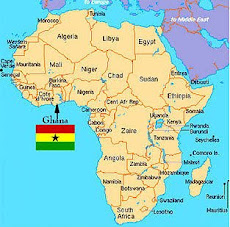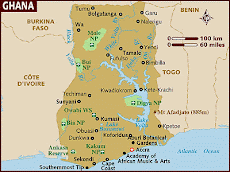Living in Northern Ghana has really brought into focus the significance of having a regular water supply. We are living in comparative luxury, in that we have a tap in our garden and water flows on most days between about 4.00 a.m. and 7.00a.m., although the timing is rather unpredictable. The early morning trek backwards and forwards with buckets of water is now a normal part of our daily routine. The reason for all Haydn’s clothing in the picture is to protect him from mosquitoes. The malarial mosquitoes bite between dusk and dawn and this, of course, coincides with the time when wer has to be collected. Now we are in the dry season, the number of insects has diminished significantly and the risk of mosquito bites is reduced. However, we are still being rigorous about anti-malarials, insect repellent, and covering up between dusk and dawn.

Some VSO volunteers have to rely on a well for their water or they have to go to the local bore hole. This is, of course, what local people have to do all the time. In many cases, the bore hole is a long way from the home. It is the women, and sometimes the children, who spend hours every day walking backwards and forwards, carrying heavy loads of water, usually in buckets or huge metal bowls. Everything is carried on the head, and we often wonder about the impact of this on the body, given the weight of water. However, it is really noticeable that Ghanaian women have wonderful posture. They must spend so much of their lives carrying things on their heads, together with babies on their backs, that there is no possibility of slouching around. Water is collected by the women and children in the early morning or evening. The picture shows local children at our nearest bore hole pumping water in the evening.

In addition to spending many hours doing physical labour, women have a very raw deal in many ways. As noted by UNICEF in a recent report (July 2009) called, Children in Ghana, “......much of the abuse and exploitation of girls and women is due to their upbringing in a society in which male dominance and control are widely accepted, and women and girls are trained and perceived to be dependent, passive and accepting of their status” . (Amazing, but just as we are typing this sentence, a womens’ protest march is going past our window, demanding an end to violence against women in this Upper West Region – Great!)

Some VSO volunteers have to rely on a well for their water or they have to go to the local bore hole. This is, of course, what local people have to do all the time. In many cases, the bore hole is a long way from the home. It is the women, and sometimes the children, who spend hours every day walking backwards and forwards, carrying heavy loads of water, usually in buckets or huge metal bowls. Everything is carried on the head, and we often wonder about the impact of this on the body, given the weight of water. However, it is really noticeable that Ghanaian women have wonderful posture. They must spend so much of their lives carrying things on their heads, together with babies on their backs, that there is no possibility of slouching around. Water is collected by the women and children in the early morning or evening. The picture shows local children at our nearest bore hole pumping water in the evening.

In addition to spending many hours doing physical labour, women have a very raw deal in many ways. As noted by UNICEF in a recent report (July 2009) called, Children in Ghana, “......much of the abuse and exploitation of girls and women is due to their upbringing in a society in which male dominance and control are widely accepted, and women and girls are trained and perceived to be dependent, passive and accepting of their status” . (Amazing, but just as we are typing this sentence, a womens’ protest march is going past our window, demanding an end to violence against women in this Upper West Region – Great!)


The point about the role of women is well illustrated by an experience of one of our VSO colleagues, Mike. He was queuing to get water from the well. Seeing that he was a white man, a local man approached him and insisted that Mike shouldn’t carry his own water. Mike protested at first, but then thought it might be impolite to refuse the Ghanaian man’s offer. At this point, the man called for his sister to carry Mike’s water. Men don’t carry water - or very much else, it seems!
Ghana’s main water supply comes from the Volta Lake, the largest human made lake in the world. Hopefully one day it will be piped as far as the Northern regions of Ghana. Near to us is a significant tributary of this lake, the Black Volta River. Last weekend, we visited a village near this river, inhabited by the Lobi tribe. The only other inhabitants of this area are the Hausa people who originate from Nigeria. They rely on fishing in the Volta for their livelihood.
The Lobi people moved to this area from Burkina Faso a few centuries ago, when they were escaping from conflict in their own country. The people have to get clean water supplies from the bore hole, which, again involves a great deal of walking. The women below are pictured at the bore hole in the early morning, and in the evening as they headed back to their village with their water supplies.


Our area of Ghana is renowned for slave raids in the 17th – 19th centuries. The islands on the river Volta provided a safe refuge for people escaping from the raiders. The Lobi villagers view the hippos in the river as sacred, as their traditional folklore says they helped people to escape to the islands, by acting as stepping stones. In the Lobi community, families live in compounds of about 50/60 people.

They are subsistence farmers. The pictures below show their goats, the sorting and pounding of bambara beans, the crops (bambara beans, pumpkin seeds and chilli peppers) drying on the roof , and the silos for storing grain.




They also keep chickens and guinea fowl, as these are often used as sacrifices to their ancestors and gods, as well as for eating. The people have produced nesting boxes made out of mud and straw.

The xylophone, rather than the drum, has great significance in the Lobi culture, and each village has at least one xylophone. These are used for all kinds of rituals and ceremonies. Any man that is born with clubbed hands is said to have “xylophonia” and he will be specially trained as a xylophone player. The man in the picture demonstrated the xylophone for us.

The village children were very wary of us and far too shy to come very close to us. White people are a rarity in their village.

As far as our work is concerned, we are very pleased with the way it is going at the moment. We have now established good working relationships with a number of headteachers, teachers and education officers. We are planning some workshops on leadership and management for headteachers, which we will hold during January and February.
During the past week, Haydn has been working with our housemate, Mel, on maths workshops with curriculum leaders. The second picture below shows one of the participants in the workshops (Pasky with her son, Vaness). Babies go everywhere with their mothers. Teachers in classrooms have their babies on their backs. Women have babies on their back while they are working. This seems to be a nation of very contented babies. We have not seen a single baby crying. We have spoken to some women about this and they can’t believe that in the UK, mothers don’t carry their babies on their backs, but put them into carriages with wheels!!





































